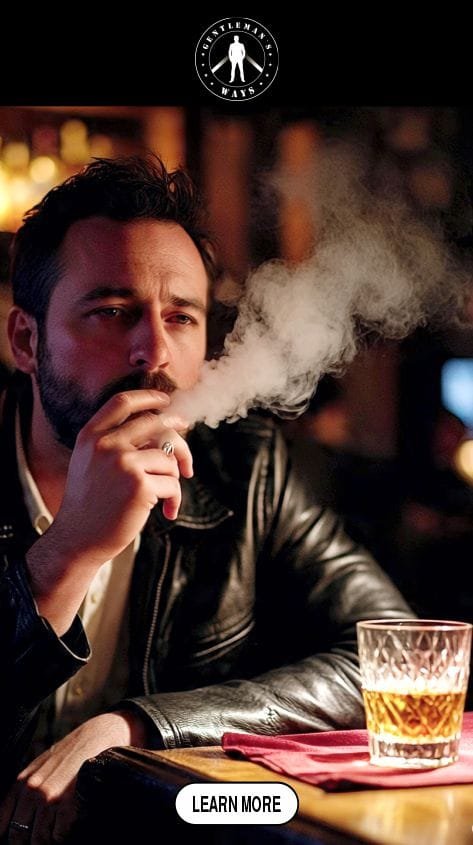Last updated on December 9th, 2025 at 01:59 pm
Learn how alcohol and smoking lower testosterone in men by impairing hormone balance, reducing sperm health, weakening muscles, and increasing fatigue that affects overall vitality.
You might not realize how much your habits affect your hormones until the signs start showing: low energy, weaker drive, and slower muscle growth.
Testosterone plays a central role in shaping how strong, focused, and confident you feel every day.
Yet, alcohol and smoking quietly chip away at this natural balance.
Alcohol interferes with hormone production in your testes, while smoking floods your system with toxins that weaken your body’s hormonal control.
Together, they can lower your testosterone, affect your mood, and even reduce sexual performance.
In this post, you’ll see how these two habits impact your testosterone levels and what you can do to protect your health, vitality, and masculine strength.
The Impact of Alcohol on Testosterone
Alcohol may seem harmless in moderation, but it can quietly disrupt your testosterone balance.
When alcohol enters your system, it affects the liver, a key organ for hormone regulation.
Excessive drinking interferes with testosterone production by altering hormone signals from the hypothalamus and pituitary gland, reducing libido and sexual performance.
In the long run, chronic alcohol use damages the liver, hindering its ability to process hormones properly.
This imbalance increases estrogen while lowering testosterone, leading to fatigue, muscle loss, and low energy.
Even though moderate intake may not cause immediate harm, regular or heavy drinking can weaken your hormonal health.
Being aware of this connection helps you make better choices that protect your testosterone levels and overall male vitality.
Related Posts
What is Low Testosterone Actually?
Testosterone Test and How to Interpret It
Can High Testosterone in Men Be Bad?
Testosterone-Boosting Herbs in Your Kitchen
Natural Foods that Boost Testosterone Production
Why Fasting is Important for Your Testosterone
Alcohol and Hormonal Imbalance
When you drink, your body does more than process alcohol; it also changes how your hormones work.
Alcohol can trigger the conversion of testosterone into estrogen, mainly in the liver, disrupting your hormonal balance.
As this shift continues, your testosterone levels drop, leading to low energy, poor sexual drive, and slower muscle recovery.
You might notice fatigue, reduced strength, or a decline in motivation, all tied to this hormonal imbalance.
What surprises many men is that these effects can appear even with regular, moderate drinking.
Consistent intake gradually weakens hormone regulation and impacts your vitality.
By paying attention to how alcohol affects your testosterone, you can make smarter choices that support stronger hormonal balance, better performance, and lasting health.
Liver Health and Testosterone Production
Your liver plays a chief role in keeping your hormones balanced, especially testosterone.
It converts testosterone precursors into active hormones and helps clear excess estrogen from your system.
When you drink too much alcohol, it creates a toxic burden on your liver, leading to inflammation, cell damage, and impaired hormone metabolism.
Studies show that men with liver damage tend to have lower testosterone and higher estrogen levels, resulting in reduced libido, energy, and sexual performance.
As the liver struggles to function, estrogen builds up and further suppresses testosterone production, creating a continuous cycle of hormonal imbalance.
This can cause fatigue, mood swings, muscle loss, and increased body fat.
Maintaining liver health through moderation and proper nutrition directly supports testosterone production and overall male well-being.
Protecting your liver is one of the most effective ways to keep your hormones in check and sustain long-term vitality.
Alcohol and Sleep Quality
When you drink before bed, it might seem like alcohol helps you relax, but it actually disrupts your sleep cycle and hormone balance.
Research shows that alcohol reduces the time spent in deep and REM sleep, the stages where your body produces and regulates testosterone.
Without these restorative phases, your sleep becomes fragmented, leaving you tired and lowering your testosterone levels.
Studies also reveal that men who consume alcohol before sleep feel less rested and experience more fatigue, worsening their hormonal imbalance.
Before long, regular drinking can cause chronic sleep disturbances, leading to decreased energy, low libido, and poor recovery.
Limiting alcohol intake, especially at night, helps preserve deep sleep quality, supports testosterone production, and promotes better overall health and vitality.

The Effect of Smoking on Testosterone
You may already know that smoking harms your lungs, but it also takes a quiet toll on your hormones.
Every cigarette you light up sends nicotine and other toxic chemicals into your bloodstream, where they begin to disrupt the natural balance of testosterone, the hormone that drives your strength, energy, and sexual health.
Nicotine Disrupts Hormone Signaling
When nicotine enters your body, it interferes with the hypothalamic pituitary gonadal axis, the system responsible for regulating hormone production.
This interference weakens the signals that prompt your testes to produce testosterone.
As testosterone levels drop, you may experience low energy, reduced sex drive, and slower muscle recovery.
In no time, this hormonal imbalance can affect your confidence, motivation, and overall performance in daily life.
Toxins Damage Blood Flow and Sexual Function
Smoking also exposes your body to carbon monoxide, formaldehyde, and other toxins that harm your blood vessels.
Damaged vessels restrict circulation, making it harder for oxygen and nutrients to reach your tissues, including those needed for sexual performance.
Poor blood flow affects erections, lowers endurance, and can further reduce testosterone levels, creating a downward spiral that weakens both physical and hormonal health.
Smoking and Sperm Health
Cigarette smoke not only lowers testosterone; it also harms sperm quality.
The same toxins that affect your blood and hormones can reduce sperm count, mobility, and vitality.
This can make conception difficult and increase the risk of reproductive problems.
Protecting your reproductive health means protecting your testosterone, and that starts by cutting back or quitting smoking altogether.
Nicotine and Hormone Suppression
You may not notice it right away, but every puff of a cigarette triggers chemical reactions that quietly weaken your body’s natural hormone balance.
Nicotine, one of the main components of tobacco, directly interferes with testosterone production in your testes and disrupts the system that regulates hormonal activity.
Over time, this leads to lower testosterone levels, reduced energy, and declining sexual health.
Nicotine Disrupts Testosterone Production in the Testes
When nicotine enters your body, it reaches your testes and interferes with the cells responsible for making testosterone.
These cells, known as Leydig cells, need proper stimulation to function well. Nicotine slows this process, lowering testosterone output.
This hormonal disruption can leave you feeling tired, less motivated, and less confident in your physical and sexual performance.
The Hypothalamic Pituitary Gonadal Axis Under Attack
Your body’s hormone control system, called the hypothalamic pituitary gonadal axis, relies on clear communication between your brain and testes.
Nicotine interrupts this process by reducing the release of luteinizing hormone and follicle-stimulating hormone.
These two hormones are the messengers that tell your testes to produce testosterone.
When they are suppressed, testosterone production drops, affecting your energy, muscle strength, and mood.
Toxins and Inflammation Damage Hormonal Balance
Cigarette smoke introduces toxic compounds that create inflammation in your body.
This inflammation harms your testicular tissue, making it harder for your body to maintain proper hormone balance.
Persistent inflammation from smoking can lead to a steady decline in testosterone and an increase in health problems linked to low hormone levels, such as fatigue, irritability, and low libido.
The Long-Term Impact of Smoking on Male Vitality
The longer you smoke, the more your hormonal health suffers.
Men who smoke frequently report symptoms like reduced sexual desire, slower recovery after exercise, and mood swings.
These changes don’t happen overnight, but they gradually erode your physical and mental well-being.
Quitting smoking helps reverse this trend, allowing your hormone system to recover and testosterone levels to improve.
Smoking and Blood Flow
Smoking quietly weakens your body’s circulation, damaging the blood vessels that deliver oxygen and nutrients to vital organs.
The toxins in cigarette smoke cause arteries to narrow and lose elasticity, making it harder for blood to flow freely.
This poor circulation affects more than just your heart; it also impacts your sexual performance and testosterone levels.
Healthy blood flow is necessary for strong erections and hormone production, but smoking limits this process, leading to erectile dysfunction and hormonal decline.
Studies show that men who smoke experience reduced erection quality, lower testosterone, and higher stress linked to poor performance.
Since testosterone synthesis depends on nutrient-rich blood reaching the testes, restricted circulation can gradually weaken male vitality.
Quitting smoking improves blood flow, restores hormonal balance, and helps rebuild strength, energy, and sexual confidence naturally.
Combined Effects of Alcohol and Smoking on Testosterone
If you drink and smoke, your habits may be quietly harming your testosterone levels.
Alcohol and tobacco both disrupt hormonal balance, and when used together, their effects multiply.
Lower testosterone affects your energy, libido, and muscle strength, shaping how you feel physically and mentally every day.
Alcohol Reduces Testosterone Production
Excessive alcohol interferes with hormone signaling in your body, especially in your testes, where testosterone is produced.
This disruption lowers androgen levels and reduces the ability of your body to maintain healthy hormone balance.
Men who drink heavily may notice fatigue, weaker sexual drive, and slower recovery after exercise as testosterone levels decline.
Nicotine and Toxins Compound the Problem
Smoking introduces nicotine and other toxins that affect hormone regulation and blood flow.
These substances impair your endocrine system and limit nutrient delivery to testosterone-producing cells, deepening the effects of alcohol.
Together, alcohol and smoking accelerate hormonal decline and harm your overall vitality.
Health Consequences of Combined Use
When testosterone drops, you may experience reduced libido, loss of muscle mass, low energy, and mood changes like irritability or anxiety.
Chronic use increases the risk of obesity, cardiovascular issues, and bone density loss.
These changes can affect your daily life, relationships, and physical performance, creating a cycle that is difficult to reverse without addressing both habits.
Practical Steps to Protect Testosterone
Protecting your testosterone requires deliberate choices in your daily routine.
Small changes in habits like drinking, smoking, diet, exercise, and sleep can help maintain your hormone balance, energy, and vitality over the long term.
Moderate Alcohol Consumption
Limiting alcohol can have a direct impact on testosterone production.
Aim to keep drinks to a few per week and choose lighter options instead of heavy beverages.
Cutting back reduces hormonal disruption and supports liver health, which plays a key role in hormone metabolism.
Talking with your doctor about strategies to manage alcohol intake can make the process more manageable and sustainable.
Quit Smoking and Reduce Toxins
Smoking introduces nicotine and other toxins that disrupt hormone function and blood flow.
Quitting improves testosterone production, sexual performance, and overall health.
Support networks, counseling, or nicotine replacement tools can help you stay on track.
Stress-reducing practices like meditation, yoga, or breathing exercises also make quitting easier.
Eat Testosterone-Supporting Foods
Your diet has a strong influence on hormone health. Include foods rich in zinc, vitamin D, and omega-3 fatty acids, like fish, eggs, nuts, seeds, and leafy greens.
Regular fruits and vegetables supply antioxidants that help protect testosterone-producing cells and support overall metabolic health.
Exercise Regularly
Strength training and cardiovascular workouts stimulate testosterone production naturally.
Resistance exercises like weightlifting or bodyweight routines promote muscle growth and improve energy, while cardio enhances circulation, supporting hormone distribution and vitality.
Prioritize Sleep
Getting 7 to 9 hours of quality sleep each night is critical for testosterone synthesis.
Poor rest reduces hormone production, lowers energy, and increases fatigue.
Maintaining a consistent sleep schedule supports recovery and balances your endocrine system.
Manage Stress
Chronic stress raises cortisol, which can counteract testosterone.
Daily mindfulness, meditation, or relaxation techniques help control stress levels, protecting your hormones and boosting energy, libido, and mental clarity.
Conclusion
How Alcohol and Smoking Lower Testosterone in Men is a reality that can quietly affect your strength, energy, and sexual health.
Drinking alcohol disrupts hormone signals in your testes and impairs liver function, while smoking floods your body with toxins that interfere with hormone production and blood flow.
Together, these habits reduce testosterone, weaken muscles, lower libido, and increase fatigue.
You may notice slower recovery, lower energy, or reduced confidence in daily life.
By moderating alcohol intake, quitting smoking, prioritizing sleep, exercising, and eating nutrient-rich foods, you can protect your testosterone levels.
Taking control of these lifestyle factors not only supports your hormonal health but also restores energy, vitality, and overall well-being, giving you the physical and mental strength to perform at your best.
Frequently Asked Questions
What are the main ways alcohol lowers testosterone in men?
Alcohol interferes with hormone signaling in the testes and alters liver function, increasing estrogen levels while reducing testosterone, which lowers libido, energy, and muscle strength.
How does smoking affect testosterone production?
Nicotine disrupts the hypothalamic pituitary gonadal axis and damages Leydig cells in the testes, reducing testosterone output, lowering energy, weakening muscles, and decreasing sexual drive.
Can alcohol and smoking together worsen testosterone decline?
Yes, alcohol and smoking compound hormonal disruption. Alcohol reduces androgen production, and smoking limits blood flow and hormone signaling, accelerating testosterone loss and related health problems.
What lifestyle changes help restore testosterone after alcohol and smoking?
Reducing alcohol, quitting smoking, eating zinc and vitamin D-rich foods, exercising, sleeping well, and managing stress can restore testosterone and improve energy and vitality.
References
- Alcohol and Testosterone: Long-term & Short-term Effects
- Does Alcohol and Smoking Harm Men’s Fertility & Sex Life?
- Ask the Doc: How does smoking affect testosterone?
- Alcohol, Smoking, and Their Toll on Testosterone Levels
- Does Alcohol Lower Testosterone? Your Guide to Hormones
Pyo Merez is a men’s lifestyle enthusiast and writer about the gentleman’s place and impact on society. Raised by a distinguished gentleman dad, he offers unique insights into how the mind of a gentleman works and how societal norms shape gentlemen’s identity and vice versa.
Through his insightful articles, Pyo taps into the depths of gentleman culture to provide perspectives on etiquette and manners in modern society.

